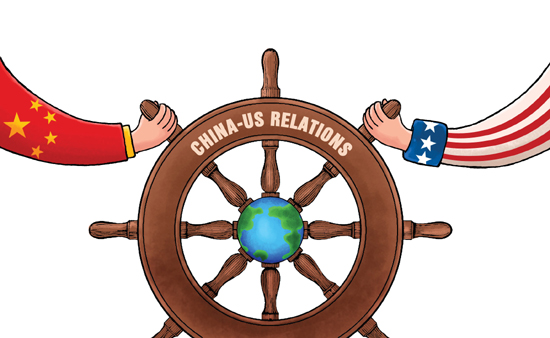It is in US' interest to accept China's rise
By Wang Fan | China Daily | Updated: 2018-01-06 10:03

Engaging with China has always been a political compulsion for US administrations. Former US president Barack Obama's "pivot to Asia" strategy and incumbent President Donald Trump's "Indo-Pacific" strategy suggest the United States will increase its presence in Asia. Though the "Indo-Pacific" strategy is still a work in progress, it is set to pose new challenges to the China-proposed Belt and Road Initiative, and regional cooperation as a whole.
The foremost of those challenges is the Democratic People's Republic of Korea's nuclear issue, where China and the US still have much room for cooperation, and fortunately some substantial efforts in that direction are being made. But the de-escalation of tensions on the Korean Peninsula and the ultimate resolution to the issue depend on continued cooperation between China and the US. Or else, it will become even more difficult to resolve the issue.
China plays an important but limited role in the issue, and what the US expects it to do is simply not possible, as the two sides employ different approaches to resolve the issue. Besides, other issues such as the Tai-wan question may jeopardize Sino-US relations.
Sino-US ties have also entered a new era. Along with more fruitful engagements in the economic and cultural spheres, the two sides have reached common ground on security cooperation, including the Korean Peninsula nuclear issue. But uncertainty still looms, with new causes of friction between the two sides emerging.
China-US relations are at the center of US strategy toward Asia. The US is reshaping its Asia strategy, and China will prove to be an indispensable partner in this effort, as opposed to some US allies whose roles are more or less interchangeable. Many regional and global issues cannot be resolved without the cooperation between China and the US.
But for this relationship to work, the US has to change its policies toward China.
Both sides should focus on issues of strategic importance, while working to shelve their differences on lesser issues, as minor issues should not stand in the way of overall stability of bilateral relations. Nor should differences obscure or obstruct the tremendous progress that has already been made.
It is essential to maintain overall stability in Sino-US relations. And trust will underpin stability, and stability will reinforce trust. Like other bilateral ties, Sino-US relations will not be free of differences. Therefore, neither side should wait till all differences are resolved to build a stable relationship.
Since dynamism is needed to manage such a relationship, the US would do good to respond more positively to the new initiatives and new proposals championed by China, instead of scrutinizing every idea stemming from China through the lens of skepticism and zero-sum competition. For instance, the Asian Infrastructure Investment Bank met strong resistance from the US, which ultimately proved futile.
In other words, the US must accept the reality that China will continue to grow stronger; and any attempt, be it engagement or containment or "co-engagement", to curtail China's influence will come to naught.
As long as China's rise is peaceful, the US should not try to intervene or obstruct, because the best way to meet competition is not to contain others, but to improve oneself in order to outperform the others. Seeking hegemony or dominance over a rising country has never worked.
The author is assistant president of China Foreign Affairs University.
Courtesy: chinausfocus.com
























